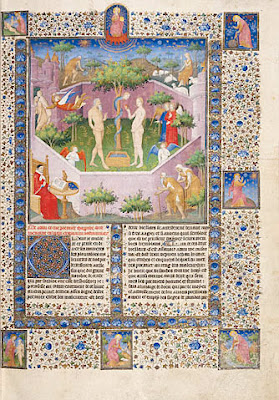The following analysis is from Andrew Moore's "Universal Teacher" website. Moore's interpretation of the poem may in places be a little different to your own. London
LondonThis is a poem which makes sense to the modern reader, as it exposes the gulf between those in power and the misery of poor people. The picture of the city as a place of nightmare is common in the 20th century, but is perhaps surprising to find in such an early text as this. We have to wait for the novels of Dickens and James Thomson's Victorian poem The City of Dreadful Night, before we find such a grim view of the city reappearing.
Although there are several details which we need to note, we should begin with the central metaphor of this poem, the "mind-forg'd manacles" of the second stanza. Once more a vivid symbol explains a deep human truth. The image of the forge appears in The Tyger (stanza 4). Here Blake imagines the mind as a forge where "manacles" are made. "Manacles" (for the hands - French les mains) and shackles for the legs, would be seen on convicts, perhaps passing along the streets on their way to prison or, commonly in London in Blake's time, on their way to ships, for transportation to Australia. For Blake and his readers, the image is a very striking and contemporary one: they will have seen "manacles" and will view them with horror. The image is also an allusion (reference, loose quotation) to an even more famous statement. In 1762, some thirty years before Blake wrote London, the Swiss philosopher Jean-Jacques Rousseau wrote in The Social Contract: "Man is born free, but everywhere he is in chains". Blake agrees with Rousseau that man's lack of freedom, his "manacles" are "mind-forg'd" - they come from the ideas and outlook imposed on us by external authority.
We see this beautifully in the poem's opening: it is a matter of fact that charters were granted to powerful people to control the streets of London and even the river. It is absurd that the streets are "chartered" (not free to ordinary people) but blatantly so in the case of the mighty river, which cannot really be controlled by the passing of a law. Blake writes ironically of "the chartered Thames". The "weakness" and the "woe" (a strong word in 1794; =misery) of every person is plain to see "in every face", as in their cries, whether of adults or babies (stanza 2).
Blake gives us three powerful examples of this "weakness" and "woe", starting with the chimney-sweep. As the church building is literally "black'ning" with smoke from the chimneys, so the church as an organisation, which should help the poor, is blackened, metaphorically, with shame at its failure to give that help. The church should be appalled, as the poet evidently is, by the cry of the "chimney-sweeper". (There is a pun here: "appals" means "goes pale", as with fear, but these churches are going black, with smoke and soot.)
The second image, of the "hapless" (unfortunate) soldier is topical: the poem was written shortly after the start of the French Revolution: this was so bloody an uprising that the figure of speech called hyperbole (=exaggeration) was often used, as blood was said to be running down the walls. Blake shows how the unhappiness of the English soldier could, if its causes were ignored, lead to similar bloodshed here.
But the last image is the most shocking to Blake, as to us: the cry of the child-prostitute is the truth behind respectable ideas of marriage. New birth is no happy event but continues the cycle of misery, and the wedding carriage is seen as a hearse, leading to a kind of death (of innocence? of happiness?). The word "plagues" here suggests the sexually transmitted diseases which the "youthful harlot" would contract and pass on to others (men married for convenience but with no desire for their wives), giving her cursing words real destructive power.
Writing about poetry
Each poem is (or should be) unique, but many poems can be explained in terms of certain elements or conventions which are commonly used: in discussing a poem, you might consider its subject (what it is obviously about), its theme (what it is about at a deeper level, important ideas), its argument (how the ideas are organised), its structure and form (use of stanzas, rhyme, metre and so on), its key images (word-pictures, symbols, metaphors and similes) and any other effects (like sound-effects, puns, allusions). If there is not much to say on one of these, don't worry: there will always be something worth saying on some of them, if the poem is any good. These different categories are now explained in more detail. In your writing they do not need sub-headings, but should normally appear in different paragraphs.
http://www.universalteacher.org.uk/poetry/blake.htm
 How to annotate Chaucer for understanding and interpretation in “The Merchant’s Tale”
How to annotate Chaucer for understanding and interpretation in “The Merchant’s Tale”








